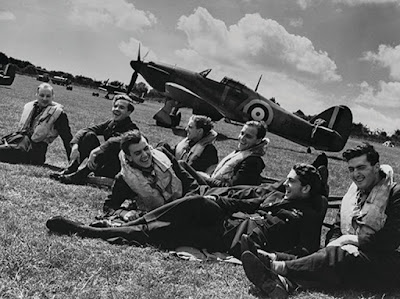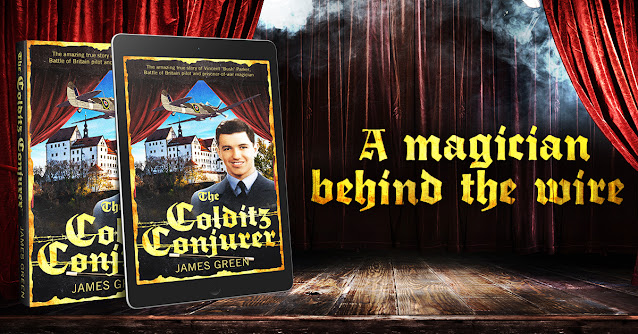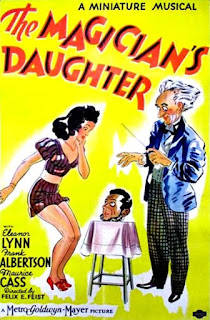"Never in the field of human conflict...": a magician is one of the few
"Never in the field of human conflict was so much owed by so many to so few..."
By mid-1940, German forces had occupied much of Eastern Europe, Denmark, Norway, France and the Low Countries, leaving Britain and her empire standing alone to defeat the Nazi menace.
In July, Hitler ordered the preparation of Operation Sea Lion, the invasion of Great Britain.
The period that followed, through to October 1940, became known as the Battle of Britain. It was fought in the skies, as the Luftwaffe (German air force) launched a stream of deadly raids, day and night, to compel Britain to agree to a negotiated peace settlement.
The Luftwaffe first aimed to destroy Britain's airfields. As the battle progressed, it also targeted factories involved in aircraft production and strategic infrastructure. The Nazis wanted to gain air superiority over the Channel, to allow an amphibious and airborne assault.
Leading the defence of the United Kingdom, were the airmen and aircraft of the Royal Air Force (R.A.F.) and the Fleet Air Arm (F.A.A.) of the Royal Navy.
Throughout the summer, Hurricanes and Spitfires were in action day in, day out. The pilots, many of them flying their first sorties, engaged the fighters of the Luftwaffe and the bombers they escorted, in dogfights over the south of England. The pilots and ground crews, exhausted, depleted and stretched to the limits of their endurance, knew the desperate importance of the continuing battle.
One of these pilots was Vincent Parker, a British-born, Australian-raised, former schoolboy magician. As a teenager Vincent became proficient at card tricks, sleight-of-hand magic, and even mastered basic hypnotism techniques. An accomplished athlete and gymnast, he was hired by a local department store to perform acrobatics and magic to attract customers. While performing one day, a visiting magician happened to catch his act. He saw potential in Parker and offered him a job as an assistant. Aged 18, Parker left his family home in the Australian outback, to join the illusionist's touring company.
Parker served his magic apprenticeship for several months, touring in shows across Australia and New Zealand, and learning his craft. But, with war looming, he reluctantly quit his new profession and travelled to England to serve his mother country. He joined the R.A.F. and was accepted for pilot training in early 1939, qualifying as fighter pilot in April 1940.
Flight Lieutenant Parker, known as 'Bush' Parker by his colleagues, was assigned to No. 234 (Madras) Squadron, a unit equipped with the Supermarine Spitfire Mk I fighter. His first role was flying Spitfires as fighter-protection for patrol bombers hunting for U-boats off England's southwest coast. On 14 August 1940, to reinforce the British defence, Parker’s squadron was moved up from Cornwall to Middle Wallop air station in Hampshire.
The next day, 15 August, proved to be the most decisive day in the Battle of Britain. Prime Minister Winston Churchill described it as "one of the greatest days in history". The Luftwaffe flew nearly 1,800 sorties that day, in a massive onslaught on Britain's airfields and Chain Home (radar detection) sites. By the evening, a hundred aircraft were lost, with the R.A.F. succeeding in severely blunting their German attackers (the Luftwaffe lost 74 aircraft, compared to 34 for the R.A.F.).
234 Squadron was sent into action late in the afternoon, under instructions to locate and engage an inward-bound Luftwaffe bomber force heading their way across the English Channel. The force comprised forty Ju87 dive-bombers, escorted by sixty Messerschmitt Bf-109s and twenty-five Bf110s.
Although outnumbered by a German force of 125 aircraft, the twenty British fighters miraculously managed to halt the progress of the raiders and many of the attackers were brought down. Parker shot down two enemy aircraft.
But the British success was not without losses. 234 Squadron lost three aircraft. One was shot down over Bournemouth. Another, badly damaged well out to sea, headed towards France where the pilot crash-landed on a beach near Cherbourg and was taken prisoner. The third suffered a damaged engine, forcing the pilot to bail out over the Channel. This was Vincent Parker. He related what happened in his post-liberation report:
“I took off from Middle Wallop in a Spitfire aircraft at 1700 hours to intercept German bombers. After two combats with [Bf] Me-110, which I shot down, my engine gave up [or was hit] and I had to bail out from about 900 feet."
Fortunately, Parker survived bailing out of his Spitfire, but was now alone in the English Channel, with just his issued lifejacket to keep him afloat. Help eventually came, but not in the form Parker would have wished.
"After almost four hours in the water, a German speedboat picked me up and took me to Cherbourg.”
'Bush' Parker was now a prisoner-of-war and remained so for four-and-a-half years.
As the aerial conflict reached its apex, Churchill paid tribute to the enormous efforts made by the fighter pilots and bomber crews to defend the nation, in a famous speech. "Never in the field of human conflict was so much owed by so many to so few...", he said.
By September 1940, the Luftwaffe had lost the Battle of Britain. British victory owed much to superior aircraft, ingenious tactics and the technological advantage of radar.
In the unrelenting fight for control of British airspace the R.A.F. lost around 800 planes, while the Luftwaffe lost more than 1,200. The Germans couldn’t continue this kind of sustained battle and focus shifted to a different strategy - large-scale night-time bombing raids against London, and other major cities and ports. Known as The Blitz, this lasted until May 1941. But, it failed to knock Britain into submission and Hitler finally gave up on his plans to invade.
Germany's failure to destroy Britain's air defences to force an armistice was the first major German defeat in World War Two and a crucial turning point in the conflict.
Several sources, of both family and friends, recall that 'Bush' Parker also had some connection to The Great Levante (Leslie George Cole). Levante was Australia's most famous illusionist from the 1930s through to the late 1950s. 'Bush' may have seen Levante's show as a young boy, as it toured eastern Australia. From 1933 to 1940, Levante was based in the U.K., touring London and the provinces, with occasional trips to Europe and a short visit to the U.S.A. It is possible 'Bush' met up with Levante while they were both in the U.K., perhaps after a show. He may have corresponded with Levante (who edited a British magic society journal). Or, even attended the grand farewell luncheon held for Levante by British magicians on 4 August, 1940, before the illusionist headed back 'down under'.
Related article: 'Bush' Parker: The Escapist' (Part 1) tells the story of Vincent 'Bush' Parker's capture by the Germans and his early escape attempts before he arrives at Oflag IVC Colditz. Blog link
Related article: 'Bush' Parker: The Escapist' (Part 2) tells the story of Vincent 'Bush' Parkers time at Oflag IVC Colditz and how he combined he applied his magic skills to escaping. Blog link
Related article: Conjuring up war-winning aircraft. Magician and politician Frederick Montague M.P.'s leading role in the Ministry of Aircraft Production. Blog link.
Related article: Magic over the airwaves, a blog about magicians on the radio during World War Two, including how Magic Circle member and famous author, J.B. Priestley, steadied the nation's nerve during the Blitz and the Battle of Britain. Blog link.
Related article: Evacuees: memories of magic, a blog about the role of magicians in Operation Pied Piper, the evacuation of children from major cities during the Blitz. Blog link.
Research supported by The Good Magic Award 2021 from The Good Thinking Society
*** AVAILABLE NOW ***
A school-boy magician from the Australian outback, ‘Bush’ left home to become an assistant to a master illusionist. With World War Two looming, he gave up this promising career to train as a Spitfire pilot.
One of Churchill’s ‘Few,’ he fought in the Battle of Britain until he was shot down in a dramatic dogfight. As a prisoner-of-war in Germany, Vince Parker earned a reputation as a persistent escaper. He ended up in the infamous Colditz Castle, a high-security fortress from which the Germans thought escape was impossible.
In the footlights of the castle’s theatre, this charismatic officer used his magic skills to boost the morale of his fellow prisoners. But, behind locked doors, he applied the secrets of stage magic and escapology to the real-life challenge of getting back home.
A remarkable tale of perseverance, courage and cunning in the face of adversity, The Colditz Conjurer features over 55 original photographs and maps. 126 pages.
“He was an outstanding hero among his fellow prisoners.”
- Don Donaldson, British POW in Colditz













Thank you because you have been willing to share information with us. we will always appreciate all you have done here because I know you are very concerned with our. Zoom magician London
ReplyDeleteVery efficiently written information. It will be beneficial to anybody who utilizes it, including me. Keep up the good work. For sure i will check out more posts. This site seems to get a good amount of visitors. street magicians
ReplyDeleteVery efficiently written information. It will be beneficial to anybody who utilizes it, including me. Keep up the good work. For sure i will check out more posts. This site seems to get a good amount of visitors. Las Vegas Comedy shows
ReplyDelete